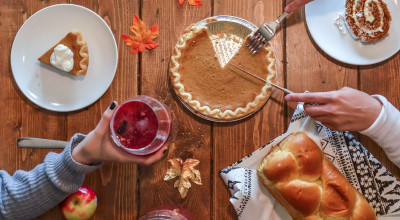How to Maintain Sobriety Over The Holidays
December 20th, 2018
The holidays can be a difficult season if you’re recovering from drug and alcohol addiction. Numerous parties and gatherings centered around the consumption of alcohol, stressful family situations, travel, and financial strain all increase the risk of a relapse. A 2006 study found that stress increases significantly over the holidays, which is one of the major factors for a relapse.
So how can you enjoy the joyous aspects of this time of year while maintaining sobriety? There are certain actions you can take to build a support network, avoid temptation, and stay clean during the holiday season.
Identify Your Triggers
Before engaging in holiday activities, make sure you know what emotions, feelings, and environmental factors increase your stress levels and trigger addictive behaviors. Knowing your triggers beforehand can help you find proactive ways to solve them, such as eating when you’re hungry and using meditation techniques to calm down when you’re angry.
Common triggers include:
· Hunger: Being hungry increases stress levels and can make us irritable. This can then lead to a craving for alcohol or drugs to help us calm down.
· Anger: When we’re angry, we want to find some relief or escape. Drugs and alcohol are often the first escape methods that will come to mind.
· Loneliness: Feeling sad, alone, and depressed can make us want to reach for substances to distract ourselves from these feelings. Sometimes, we believe that drugs and alcohol can help us “feel” something, which isn’t the case.
· Tiredness: Fatigue and lethargy are often symptoms of depression. Sometimes, we reach for drugs and alcohol for a quick energy boost – and this ultimately ends in a crash.
Connect With Your Support Network
Your sober support networks at home are incredibly important for recovery. If you are traveling for the holidays, you can feel as if you’re leaving all your safety nets behind. However, you can keep in contact with your sober network through email, text, and social media. Ask your sponsor or trusted members of your support group if you could have their contact information in case a difficult situation arises.
Don’t Be Afraid to Decline an Invitation
If you receive an invitation to a party and you’re worried about substances, a person or group of people who might attend, or you’re just not feeling up for it, don’t be afraid to say no. You’re allowed to decline an invitation to protect your sobriety and mental health. Say no to events that make you feel uncomfortable.
Focus on Your Diet
Hunger is a major stressor and a common relapse trigger. Sometimes when we’re stressed out, we can skip meals or forget to eat. To keep your mind and body healthy, it's important that you focus on eating consistently.
Try to incorporate healthy foods, such as whole grains, fruits, and vegetables, into your diet. Eat lots of protein, such as meat, fish, dairy, and nuts, so that you stay full and satisfied. For the most part, try to avoid fatty, sugary, or fried foods – but allow yourself to indulge in delicious holiday treats! Food is one of the best parts of the holiday season, so be sure to eat up.
Give Back to the Community
The shopping, parties, and gift exchanges of the holidays can be fun, but they can also be stressful. The holidays are also a time to give back to your local community through charity work or volunteering. Look and see what volunteering opportunities are available near you and spend a few hours working at a soup kitchen or distributing goods to those in need. This will help keep your mind distracted from relapsing while performing a good deed.
Bring a Sober Friend
Not all of our family members or friends are onboard with sobriety. Sometimes, you can find yourself pressured to drink or use drugs. To reduce this risk, bring along a sober friend to a party or holiday dinner. You can sip on non-alcoholic beverages and avoid the bar together in solidarity. Having someone who understands your recovery journey as your guest can help keep you accountable during the night. In addition, you’re less likely to want to drink or use drugs if you have a sober partner.
Exercise Regularly
During the holidays, make sure to engage in a regular exercise regimen. Exercise increases endorphins and can be an effective form of stress relief. In addition, it can help distract you from any relapse pressure. Consider going to your local gym or recreation center for an hour a day. If the weather is nice, you can go for a jog in your neighborhood or play sports outside. Your exercise routine can be any activity that you enjoy that gets your body moving.
Engage in Self-Care
If you’re staying with family or friends over the holidays, it can feel as if you have no time for yourself. Constantly being around other people can be tiring and sometimes you need to get away. Taking time for self-care activities, such as meditation, taking a bath, or reading a good book, is an effective form of stress relief.
Follow these tips to carve out time and space for self-care activities.
· Find a special place to escape to during difficult times. This can be a room in the house you’re staying at, a natural location, or any other place that makes you feel calm and comfortable.
· Gather materials to help you meditate and focus on sobriety. These materials can be meditation texts, sobriety resources, or the Alcoholics Anonymous big book.
· Gather any other materials that you feel would help you engage in self-care. You can find items to help you draw a bath, such as candles or bath bombs. Your favorite books, a cup of herbal tea, and comfy clothes can also aid in self-care.
Seek Professional Help
If you do relapse during the holidays, don’t panic. The journey to recovery is not a straight line. You will encounter many challenges throughout your recovery, but these challenges do not mean that you should give up. The most important thing to do during a relapse is to stay safe and seek professional help immediately.
Windmill Wellness Ranch provides holistic treatment programs for people recovering from alcohol and drug addiction. Our quiet facility in Canyon Lake, Texas offers residential treatment, physical healing, genetic testing, and more.
Contact Windmill Wellness Ranch today to learn more about enrolling in our program.


